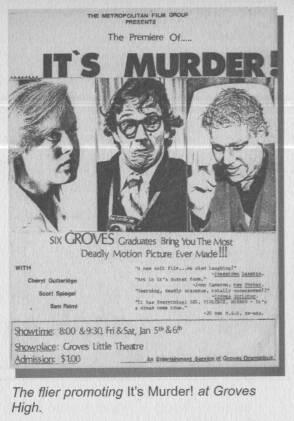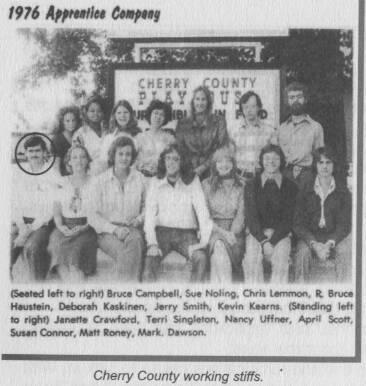If Chins Could Kill: Confessions of a B Movie Actor (11 page)
Read If Chins Could Kill: Confessions of a B Movie Actor Online
Authors: Bruce Campbell
Tags: #Autobiography, #United States, #General, #Biography & Autobiography, #Biography, #Entertainment & Performing Arts - General, #Entertainment & Performing Arts, #Actors, #Performing Arts, #Entertainment & Performing Arts - Actors & Actresses, #1958-, #History & Criticism, #Film & Video, #Bruce, #Motion picture actors and actr, #Film & Video - History & Criticism, #Campbell, #Motion picture actors and actresses - United States, #Film & Video - General, #Motion picture actors and actresses

Eventually, after forty-four screenings, the film began to fall apart.
"We finally had to retire it just to preserve what was left of it," Sam explained. "But it was hard to say good-bye to two hundred and fifty dollars a night, I will say."
If the
Kid
succeeded, we figured, a bigger film would do even better. What followed was the mystery/comedy
It's Murder! --
the
Heaven's Gate
of Super-8.
Sam and Scott wrote a story that was feature-length -- the first of its kind. To get a richer look with better sound, they also decided to shoot at twenty-four frames per second, as opposed to the standard eighteen frames. This was a huge decision -- according to Sam, "it was like going Cinemascope because it required another thirty percent of film stock."
In addition, this script required a large cast and plenty of stunts. A climactic car chase ruined Sam's family Ford Grenada. His father tried to trade in the car several months after filming, but he had a hard time.
"It's funny, the guy at the dealership said it had a cracked engine block," Mr. Raimi told Sam. "I wonder how that happened?"
Another car, a 1962 Cadillac, was purchased so it could be destroyed intentionally. This was a good news/bad news scenario, because afterward, we had to get rid of it.
Sam: We couldn't drive away, nor did we know where to put it.
Bruce: No. The concept of having, like, a wrecker come and salvage it just wasn't in the cards.
Sam: I don't think we had the right papers anyway. There was no title. There was no nothin -- we had to dump it.
Bruce: Off of Walnut Lake Road.
Sam: We hooked up a chain and towed it in a very herky-jerky way -- I was driving the wreck.
Bruce: Yeah, and someone had to steer from behind. It was a horrible jury-rigged system.
Sam: We pushed it off the cliff, remember?
Bruce: Yeah, knowing that eventually someone from the county would go, "All right, we'll get the car out of there." It was there for like a month.
Even with cost-saving measures like that, the budget of the film went well over two thousand dollars. Worst of all, it dragged into the fall, when student actors returned to school.
Not having a college to return to that fall of 1978 (more on that later), I was available and eager to double for any actor who was missing. Scott was working a forty-hour week, but at least he was still in the state. The lead bad guy, Matt Taylor, was long gone. He was a burly, sandy blond-haired guy who was clean-shaven. I was a lanky, dark-haired guy with a moustache, but who were we to be choosy?
After limping to a halt,
It's Murder!
was "released" at MSU that winter with great fanfare -- a custom poster was created and more expensive ads were run in
The State News.
"I was killing myself with ads," Sam said. "Two hundred dollars for these big ads and renting the place was one hundred dollars for janitorial services. The whole thing was very expensive. I had to lug the big speakers there in the car and the projector and the sound amplifier and the films, extension cord and the speaker wire. The heavy-gauge speaker wire was like garden hose. It was a lot of stuff to carry and pack up. It was not how you wanted to spend Saturday nights..."
The effort proved to be a fruitless affair. A handful of the cast and crew were on hand that opening night, but we turned out to be the only patrons. The next night, there was only one paying customer. Sam shares his pain:
"About thirty minutes in -- it wasn't quite halfway and I saw the shadow of a hand come up on the screen, throwing his hands up in the air saying, 'This sucks. I don't even want my money back.' Then, he stood up and the chair went
bappity, bappity, bappity
and I heard his
clump, clump, clump,
down the steps, then the door opened and I was left alone in there. I thought, I could watch the rest of the movie which is forty more minutes, or I could rewind it which is thirty.' I remember just rewinding it for thirty minutes backwards sitting in the balcony and I was thinking, I gotta somehow figure out a way not to be in this position again.'"
6
FIRST LOOK UNDER THE HOOD
High school ended right out from under me. I was having a good time as the leading man of Super-8, but reality descended like a Midwest thunderstorm and I was forced to ask myself the question:
Can you do this for a living?
A serious attempt to answer that question came during the summer of '76. A "Star Theater" up north in Traverse City Michigan was looking for apprentices during their summer stock schedule. I never really expected to get a job there, since the Cherry County Playhouse employed professionals, but I sent the application in anyway.
After salting the butcher block at Walnut Lake Market (one of my stock boy duties), I called home to see if any letter had arrived. I had been tracking the household mail pretty intensely the last few weeks and that day, one showed up. I insisted that Mom read it to me on the spot.
"Dear Bruce -- Congratulations! Your application has been accepted," Mom read, as happy as I was about the news.
It wasn't until I got home that the ramifications began to sink in. With the exception of a three-week camp outing when I was ten, I had never been away from home for very long, and certainly not alone. This payless job required me to stay, at my own expense, for three months in Traverse City, Michigan -- cherry capital of the world. To be honest, I never once thought about the money -- I would have
paid
for the opportunity to work in real theater.
Initially, I rented a room in a boardinghouse not far from downtown. Even in 1976 this was a Dickensian concept. Pretty quickly, I tired of tiptoeing around, but the price was right, and I was a free bird. I must explain that I was never the "I gotta get away from home" type since there was nothing about my teenage life that particularly compelled me to rebel. Still, it felt great to know that for the entire summer, I got to make my own decisions.
I got a taste of this freedom walking to work the first morning. A light rain was coming down, so I wore a green plastic poncho. If Mom had been around, I would also be carrying an umbrella and wearing boots. The rain increased and my head and feet got soaked, but I was bent on savoring my independence, so instead of ducking under the elms along the street, I deliberately slowed down and walked in the open, tilting my head up toward the rain.
A normal day for apprentices started at 9:00 A.M. Dave Bodenstedt, the apprentice coordinator, had a Zero Tolerance for tardiness. His policy, which I endorse, is that if you were supposed to be at work at 9:00, you were
ready to work
at 9:00. You didn't grab a cup of coffee and shoot the bull -- you hit the ground running.
THE MOTLEY CREW
It was an eclectic mix of apprentices to say the least. There were ten of us: a Coca-Cola addict, whose rotting teeth stood as testament to the habit; a movie star's son; past-their-prime hippies; sons and daughters of distinctly blue-collar parents; rich suburban kids; and me, Mr. Middle-of-the-Road. The apprentices were straight and gay, young and old, but we were the backbone of that theater.
The technical staff was a combination of imported and home-grown talent. John and Patricia, director and stage manager respectively, were a husband and wife team from New York -- both were very seasoned hands at this demanding format.
Louis, the technical director, was also a resourceful guy from the East Coast. One play required the sound of a teapot whistling, and as I passed by one day, he stopped me with, "Hey, Bruce, can you whistle?"
"Heck yes," I said.
"Good, come over here. You're gonna be a tea kettle." The final effect was a little on the cheesy side, but that's the way things were done in the fast and loose world of summer stock.
The assistant technical director, Bill, was from Traverse City. I thought Bill was pretty darned cool, because he did voice-overs for local radio commercials. He drove a hand-me-down Mercedes, complete with a "car phone." In reality, it was a regular phone that would "ring" from vibration when Bill's car got up to forty-three miles-per-hour.
"Works great on first dates," Bill proclaimed.
I wondered how many of his first dates were also his last.
WORKING STIFFS
Look up the term "apprentice" in the dictionary, and you will see it defined as "schlub, whipping boy, and/or low man on the totem pole."
We got an early whiff of the way things
really
were behind-the-scenes -- the first three days were spent folding 16,000 promotional flyers. My job was pasting a sticker of Doug McClure over George Maharas's face. Apparently, ol' George had to cancel at the last minute and we paid the price.
Once that mind-numbing chore was done, we set up the theater. By this, I mean the
entire theater --
bleachers, stage, lighting grid -- everything. It was theater-in-the-round, so the stage was situated in the middle of a circular seating arrangement. Therefore, each play had to be presented in an almost invisible format and it demanded a unique approach to lighting, set design and blocking for the actors.
It was my first taste of a twenty-hour day. I'll let a diary entry sum up the feeling:
I guess my Midwest roots were starting to show. Eventually, a number of the apprentices banded together and rented a generic condo outside of town. It became our groovy commune and I had an executive suite in the basement.
Aside from getting wet behind the ears in the real world of make-believe, it was also a very personal coming-of-age. I turned eighteen that summer and took immediate advantage of the then-current Michigan drinking law -- pina coladas were the order of the day. However, since I was also working for free, this self-financed summer resulted in gallon-sized, strawberry-scented shampoo and daily doses of Egg McMuffins.
The schedule required us to mount an entirely new play, from rehearsals to performance, each week for the next seven weeks. When the first play was ready or, even if it wasn't, it would run for a week while the next play began rehearsals.




